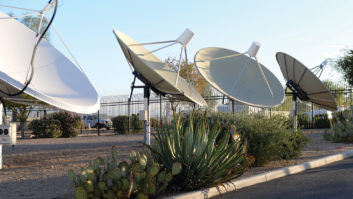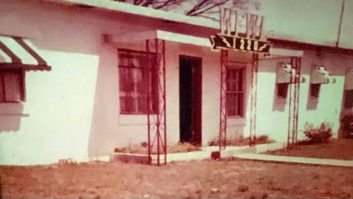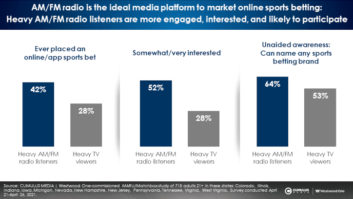
NEW YORK — Mitch Glider is hoping that WestwoodOne’s coverage of the Winter Olympics from Sochi, Russia, is “primed for gold.”
This is the first Olympics for WestwoodOne as part of Cumulus Media. The radio network merged with Dial Global Radio Networks in 2011 and took on the DG brand, but it eventually rebranded using the familiar WestwoodOne nameplate. Cumulus Media then purchased Dial Global/WestwoodOne in August 2013.
The organization holds rights to provide U.S. network radio coverage of the games Feb. 7–23. Cumulus declined to detail how many stations are expected to use the content. Some long-form programming and all hockey games will also air on SiriusXM.

Glider, vice president of engineering for WestwoodOne in New York City, devised a technical plan months ago that uses a structure for broadcast remotes based in the International Broadcast Center in Sochi. The audio architecture must be resilient enough to deliver 17 consecutive days of coverage.
His challenge is aggregating audio from numerous competition site venues, eliminating technical glitches and delivering a smooth broadcast product to the radio network’s affiliates — from the distinctive beep at the starting gate of a downhill ski race to the swoosh of a luge sled on an icy track.
He expects to be in Sochi to help execute on-air coverage that includes short reports three times an hour, 24 hours a day, through the games. WestwoodOne, which presented a 32-part series of preview vignettes, also will provide nightly recaps and live play-by-play of certain events.
18 CASES
Sochi, with a population of 400,000, is nine hours ahead of Eastern Standard time. The city is in Krasnodar, the third-largest region in Russia, according to the XXII Olympic Winter Games website. The Sochi Olympic Park is built along Black Sea coast in the Imeretinskaya Valley.

Rod Olsen and Roger Endres load 18 road cases at the CBS Broadcast Center in New York, where WestwoodOne built, staged and tested equipment for use in Sochi during the 2014 Winter Olympics. NBC Television Olympic logistics handled shipping. The equipment was headed for the WestwoodOne/NBC workspace at the International Broadcast Center. WestwoodOne is sending an air staff of approximately 10 announcers. In support, Glider worked with Howard Deneroff, executive vice president/executive producer of WestwoodOne Sports, to set the technical plan based on the programming and type of communication backhauls required, in addition to in-house communication needs at the IBC.
Glider has been planning U.S. network radio Olympic technical coverage dating back to Salt Lake City in 2002. He said Sochi presented challenges based on logistics and airfreight restrictions through customs. WestwoodOne shipped 18 road cases of technical equipment in mid-December to ensure delivery prior to start of the games.
“We are still primarily ISDN (for main program feed), but we also have dedicated IP codecs over the public Internet running parallel to the ISDNs for backup.”
The backhaul path, according to Glider, involves taking the finished audio product from Sochi, which could be live or recorded, passing it via ISDN to the CBS Broadcast Center in New York in real time, with return to Sochi for monitoring by talent.
The radio network uses Sierra Automated Systems products, Glider said, including a SAS 32KD router and Rubicon-SL consoles and Dixon mixers and ICM 32 intercom heads, which will allow WW1 to use the unit for listening, four-wire communication and intercom communication from Sochi.
It uses Telos Zephyr Xstreams for ISDN, and Telos Z/IP and Comrex Access for IP codecs, according to Glider.
The setup is similar to what WestwoodOne used in London for the 2012 Summer Games, though “we have expanded the use of IP codecs for sure and are relying on them more than ever,” Glider said.
The remote gear is set up and tested in New York and fitted for equipment modularity. “Everything is in the rack already and pre-wired. We take a modular approach with Cat-5 cable.” Glider then submits it to final test during a staging process.
All of the gear, including routers, computers, servers, codecs and consoles, is staged in the CBS Broadcast Center, where WestwoodOne’s technical operations are located and where Glider is based. (WW1 also provides technical support to CBS Radio Network news for coverage of large-scale news events and remotes, including political conventions, inaugurations and the Olympics.)

A view of the media center in Sochi. Accommodations are nearby.
Credit: Sochi 2014 Winter Games Glider designed the WestwoodOne studio space in Sochi, located within the NBC Television complex, using Visio, the diagramming program from Microsoft. Mike Eaby, WestwoodOne sports vice president/coordinating producer, visited Sochi in 2013.
IBC
The International Broadcast Center is home to international broadcast organizations covering the Olympics. WestwoodOne will broadcast from a combo studio, a long-form studio and two read-in positions, semi-enclosed for privacy, Glider said.
“It’s a bit of a departure from what we have done in the past. We have added a bit more versatility to the positions utilizing things that we have learned from previous Olympics. And we have added a small engineering space, too,” Glider said.
WestwoodOne engineer Zack Akey was set to accompany Glider to Sochi to handle technical services duties. This is Glider’s first trip to an Olympics since 2006, he said. The pair expected to arrive in Sochi in mid-January and begin assembling the studios. The opening broadcast is Feb. 7.

Inside view of the Main Media Center.
Credit: Sochi 2014 Winter Games Security within the Olympic village is expected to be tight, Glider said. Media accommodations are next to the IBC and inside the “clean zone,” Glider said, which means a lot less time standing in security lines.
Sochi, which typically doesn’t receive a lot of snow, likely will have high temperatures in the mid-20s during the Olympic visit. The mountains in Krasnaya Polyana, home to skiing and sliding events, typically receive most of the region’s snowfall.
WestwoodOne says it delivers audio content each week to 8,200 media partners and 225 million consumers.
Global Coverage
The world’s radio broadcasters will cover the games from the International Broadcast Center, from commentator positions at stadiums and other venues, and in zones where broadcasters will “mix” with and interview athletes.
Radio has a long history of covering the Olympics. The 1928 Summer Olympics in Amsterdam were the first to receive radio’s attention; full-blown radio coverage started at the 1936 Summer Olympics in Berlin.
The core of coverage — sound and video from Opening and Closing Ceremonies, and live feeds from venues — is produced by Olympic Broadcasting Services. An agency of the International Olympic Committee, OBS has been host broadcaster for Olympics Games since 2008.
OBS is manager and operator of the IBC in Sochi and the associated Mountain Broadcast Center. The IBC is headquarters for radio and TV rights-holding broadcasters. (Non-RHB reporters and print are housed in the nearby Main Press Centre.) The big, low-rise IBC is within walking distance of the competition venues in Sochi’s “coastal cluster.”
“The standard OBS studio module is just over 47 square meters [500 square feet], large enough to support a basic radio production facility,” said Matt Mason, OBS head of information and publications. “This said, many RHBs have requested custom-tailored facilities.” Right-holders typically outfit their own studios.
Competition venues are the locations of “broadcast commentary positions,” where RHB announcers can deliver coverage tailored to their audiences.
A total of 532 broadcast commentary positions are available. Each accommodates one, two or three people. “Radio broadcasters will occupy up to 79 commentary positions throughout the Sochi Olympic Winter Games site,” Mason said. For instance, BBC Radio will be using five.
At mountain venues, commentary positions are in temporary cabins with power, lighting and a heater.
RHBs have the option of booking equipped or unequipped commentary positions. “Commentary audio from the equipped positions is routed to the RHB studios through full-bandwidth connections to the commentary switching centers in both the IBC and the MBC via redundant fiber paths,” said Mason.
“At unequipped commentary positions, RHBs can order uncompressed full-duplex audio lines to IBC/MBC, ISDN lines and Internet access.” Commentator positions are also at the Medals Plaza.
Feeds from the venues are routed to a commentary-switching center in the IBC, the main hub for coordination circuits and international sound for radio.
— James Careless












